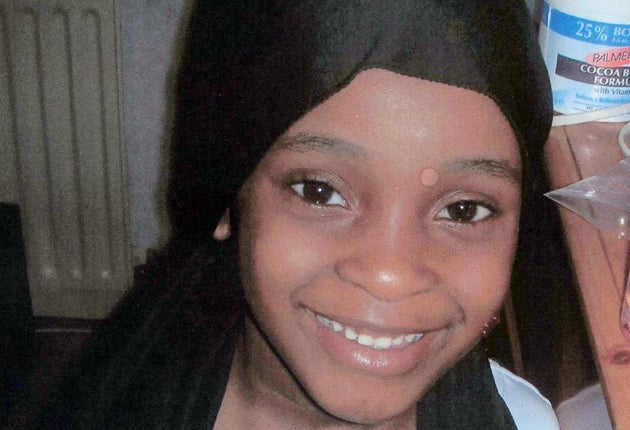Starved Khyra's death was 'preventable'

A seven-year-old girl who was starved to death by her parents could have been saved were it not for a catalogue of “missed opportunities” by social services and health professionals.
Khyra Ishaq weighed less than three stone when she slipped into a coma and died in May 2008. She had been subjected to horrendous abuse from her mother Angela Brown and her step-father Junaid Abuhamza, who were jailed earlier this year for allowing her death.
Khyra and her five siblings were regularly starved as a punishment for bad behaviour. They were so malnourished that when doctors tried to feed two of the children following Khyra’s death, they promptly fell ill – a symptom of the kind of chronic malnourishment seen in famine victims.
Brown and Abuhamza were able to cover up their abuse for months because Khyra had been taken out of school in December 2007 and was being educated at home.
But in a stinging critique of Birmingham’s social services, a serious case review (SRC) today concluded that Khyra’s death could have been prevented had social workers done their jobs properly.
The 180-page report is a damning indictment of the city’s inability to protect Khyra after she was taken out of school and subjected to months of starvation and abuse in a squalid house of locked food cupboards.
Social workers were accused of “losing sight” of the seven-year-old even though concerns were raised by her teachers who regularly caught Khyra stealing food because she was so hungry.
The report found that the city’s various protection agencies failed to communicate and co-ordinate their response whilst social workers were reluctant to follow up visits to the terraced house on Leighton Road because Brown had become skilled at filing complaints against them.
The city council, Birmingham’s primary care trusts, West Midlands Police, the Birmingham Children's Trust and the Safeguarding Board were all singled out for criticism in the report which made 18 recommendations.
The findings provoked heavy criticism from the Government, which served Birmingham City Council with an improvement notice in February last year.
Education Secretary Michael Gove said today: “It is beyond anyone’s comprehension that a child could die under such tragic circumstances. It is extremely difficult to prevent random and isolated incidents of violence against children, but the tragedy is that Khyra Ishaq endured a painful abuse over many months and eventually died, and this could and should have been prevented.”
Birmingham council said today that ten recommendations had already been "acted upon" and three members of staff who had "significant involvement" with Khyra had been subjected to disciplinary procedures.
But doubts had already been cast on whether the city, which is one of the largest local authorities, had done enough to improve its child protection services since Khyra’s death.
Today's report comes just days after a separate assessment by Ofsted – conducted over ten days in June this year – which concluded that the city council was still failing to protect vulnerable children.
The report found “critical shortcomings” in Birmingham's children's safeguarding services with some aspects of child protection labelled inadequate – the lowest possible rating.
Hilary Thompson, chair of Birmingham’s safeguarding children’s board, said she agreed with the serious case review’s findings.
“Although the scale of the abuse inflicted would have been hard to predict, Khyra's death was preventable,” she said. "The report identifies missed opportunities, highlighting that better assessment and information-sharing by key organisations could have resulted in a different outcome."
Although Birmingham’s child protection agencies were heavily criticised, the report did highlight how much harder it can be to protect children who are being educated at home.
“Within current legislation, the assessment requirement for home education is weak and there is no mandate to monitor, assess or inspect the quality of home education provision, once approval to home educate has occurred,” the report found.
Birmingham Council has said it will now write to the Government and ask it to look into strengthening home education legislation so that it does more to protect vulnerable children.
Subscribe to Independent Premium to bookmark this article
Want to bookmark your favourite articles and stories to read or reference later? Start your Independent Premium subscription today.
